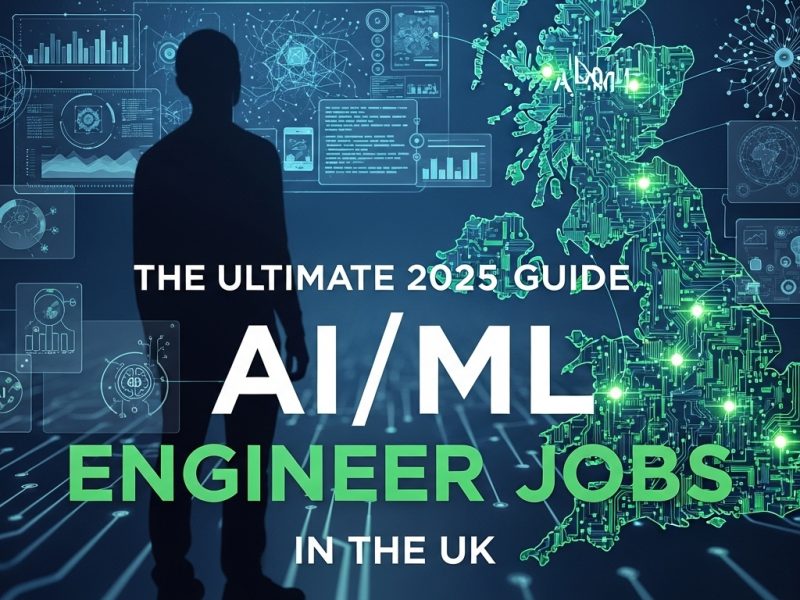Artificial Intelligence (AI) and Machine Learning (ML) have rapidly evolved from niche research fields to mainstream business priorities, transforming industries from finance to healthcare. The UK has positioned itself as a global leader in this sector, with the government-backed AI Sector Study 2024 revealing a staggering 85% increase in the number of AI companies over the past two years, now contributing £11.8 billion in Gross Value Added (GVA) to the economy. This growth fuels an insatiable demand for skilled AI/ML Engineers, creating a lucrative and dynamic job market. This comprehensive guide will explore the salaries, in-demand skills, and trends you need to navigate your career or understand the value of this niche in 2025.
The UK AI/ML Job Market: A Landscape of Opportunity
The UK’s AI ecosystem is booming. According to industry analysis, Machine Learning skills are now required in 4.93% of all permanent IT jobs in the UK, a significant jump from just 2.90% two years ago. This means that for every 20 tech jobs advertised, nearly one requires ML expertise, highlighting how integral these skills have become to the modern digital economy.
This demand is driven by several key trends shaping the hiring landscape in 2025:
-
Generative AI Takes Centre Stage: The explosion of tools like ChatGPT has pushed companies to invest heavily in building proprietary models, fueling demand for ML Engineers and Generative AI Specialists.
-
Ethics and Governance: As AI is embedded into core business processes, the need for transparent and compliant systems is creating new roles focused on AI governance and risk management.
-
Data Foundations are Critical: Companies realize that AI is only as good as the data it’s built on, leading to parallel investment in data engineering and analytics talent.
However, a note of caution comes from academic research. A study from King’s College London suggests that the impact of AI on the job market is nuanced. While there is high demand for experienced engineers, there has been a noticeable 4.5% average reduction in total employment in highly AI-exposed firms, with the effect “concentrated almost entirely in junior positions, which fell by 5.8%”. This indicates a market that highly values experienced professionals but may be contracting entry-level pathways, making strategic skill development more important than ever.
In-Demand AI/ML Roles and Salary Benchmarks
Salaries for AI/ML professionals in the UK are highly competitive, reflecting the fierce battle for talent. The median annual salary for roles requiring Machine Learning skills now stands at £80,000, marking a 6.67% year-on-year increase . Location significantly influences earning potential, with London offering a median of £90,000, while the UK excluding London has a median of £65,000.
The table below breaks down some of the most in-demand roles and their typical salary ranges in the UK for 2025, particularly based on London market rates.
| Role | Typical Salary Range (2025) | Key Focus |
|---|---|---|
| Machine Learning Engineer | £70,000 – £110,000 | Building, training, and deploying ML models into production. |
| MLOps Engineer | £75,000 – £115,000 | Managing the deployment, monitoring, and lifecycle of AI models. |
| Data Scientist | £60,000 – £100,000 | Analyzing complex datasets to derive actionable business insights. |
| AI Product Manager | £65,000 – £105,000 | Bridging the gap between technical teams and business strategy. |
| AI Governance Specialist | £70,000 – £95,000 | Ensuring ethical, transparent, and compliant use of AI. |
| Prompt Engineer / Generative AI Specialist | £55,000 – £90,000 | Optimizing interactions and outputs from large language models (LLMs). |
The Essential Skills Toolkit for 2025
To command these high salaries, professionals need a blend of technical and soft skills.
Core Technical Skills:
-
Programming Languages: Python remains the undisputed leader in the AI/ML ecosystem.
-
Frameworks and Libraries: Hands-on experience with TensorFlow and PyTorch is frequently sought after by employers.
-
MLOps and Cloud Platforms: The ability to operationalize models is crucial. Skills in MLOps practices and cloud AI platforms like AWS, Azure, and GCP are in high demand. Familiarity with specific tools like Apache Spark for data processing is also a valuable asset.
-
Specialized Domains: Expertise in Natural Language Processing (NLP), computer vision, and generative AI (including fine-tuning LLMs) will make you stand out.
Vital Soft Skills:
Technical prowess alone isn’t enough. Employers are increasingly prioritizing strategic thinking, problem-solving, and the ability to communicate complex concepts to non-technical stakeholders. Collaboration across different business functions is also key to successfully implementing AI initiatives.
Top UK Locations for AI/ML Careers
While London is the undeniable hub, accounting for a significant portion of job vacancies and offering the highest median salary, the market is becoming increasingly national. The South East and Scotland also show strong demand, with median salaries around £75,000. Promisingly, the 2024 AI Sector Study found that regions like the West Midlands, North West, and Yorkshire and Humber have at least doubled their number of AI companies since 2022 . Furthermore, the rise of remote work is a major trend, with over 1,000 remote Machine Learning jobs listed on platforms like LinkedIn, offering professionals the flexibility to work from anywhere while commanding competitive salaries.
Challenges and the Future of AI Hiring
Despite the opportunities, the market faces challenges. A 2025 report from Harvey Nash identifies talent shortage as the single biggest challenge, with AI surging to become the most scarce technology skill in the UK . Top candidates often receive multiple offers, forcing companies to streamline hiring processes and enhance benefits packages to attract the best talent.
How to Secure Your Dream AI/ML Job
-
Specialize Strategically: While having a broad foundation is good, developing deep expertise in a high-demand area like MLOps, NLP, or AI governance can make you indispensable .
-
Network Actively: Engage with the UK’s vibrant AI community through meetups, conferences, and online forums like LinkedIn. Many opportunities arise through referrals and professional connections.
-
Build a Strong Portfolio: Go beyond coursework. Develop and deploy real-world projects on platforms like GitHub. Contributing to open-source projects or participating in Kaggle competitions can provide concrete proof of your skills.
-
Demonstrate Business Acumen: Learn to articulate how your technical work drives business value—whether it’s increasing efficiency, reducing costs, or creating new revenue streams. This is what separates a good engineer from a great one .
-
Consider Certification: While not always mandatory, cloud AI certifications from AWS, Azure, or GCP can validate your skills and give your CV a boost .
Final Thoughts
The landscape for AI/ML Engineers in the UK in 2025 is one of exceptional opportunity and dynamic growth. With record investments, rising salaries, and demand that outpaces supply, there has never been a better time to deepen your expertise in this field. While the market is competitive and entry-level roles may be shifting, professionals who cultivate a strong mix of technical depth, strategic thinking, and specialized knowledge are poised to thrive. By understanding the trends, skills, and salary data outlined in this guide, you can effectively navigate the market and secure a rewarding role at the forefront of technological innovation.
Disclaimer
The information provided in this article is for general informational and educational purposes only. The salary figures, job market trends, and data are compiled from publicly available sources as cited and are subject to change. They should not be construed as financial or career advice. While we strive to provide accurate and up-to-date information, we make no representations or warranties of any kind, express or implied, about the completeness, accuracy, reliability, suitability, or availability of the information contained herein. Any reliance you place on such information is strictly at your own risk. It is always recommended that you conduct your own independent research and consult with professional advisors before making any career or financial decisions.






